Living, Loving, (and Going to the ER) in the Time of Coronavirus, Spring Continues in Seattle, Virtual or Faux AWP
- At March 08, 2020
- By Jeannine Gailey
- In Blog
 3
3
Spring Continues in Seattle, Despite Everything
The time change is here, and with it, spring is showing signs of moving in; early cherries and plums are blooming, quince, forsythia. Birds are returning, like a family of quail I spotted in the backyard, and red house finches. Emerald City Comic Con has been rescheduled. My husband has been in the house more than usual, as working from home is encouraged. We’ve been avoiding unnecessary human interactions we might have done without thinking; going to the bookstore or stopping to get flowers. Nature remains a great companion, even during an epidemic. Books, too.
- Early cherry branches
- Glenn with pink blossoms
- Me with plum trees
- A covey of quail
Living, Loving, and Going to the ER In the Time of Coronavirus
So, as nature continues to blaze ahead despite the troubles of humans, we cannot avoid the grim news. As of today, we’ve had 102 confirmed Coronavirus cases and 17 deaths in Washington State, and still our Coronavirus testing ability is pretty limited (despite promises from the government to the contrary.) Schools are closing. Every tech company has asked its employees to work from home. Social distancing and hand washing are encouraged. Stores shelves have been emptied of: bottled water, toilet paper, bleach, cold medicine, in some stores, canned goods, even Spam. Hand sanitizer and masks have been gone since two weeks ago. Glenn and I are spending a lot of time together – I mean, togetherness has a new meaning when you’re immune-compromised during an extremely contagious, fairly unknown outbreak.
This virus has changed the way we do some things; Glenn has had groceries dropped off at his car instead of going into the grocery store; I ordered books to be shipped instead of going into the bookstore. I text with my friends instead of seeing them in person.
Notes from an ER visit in the Epicenter: I had an unavoidable ER visit. I dreaded doing it, but so sick I could no longer stand on Friday night and with my PCP’s advice, we decided to go (and no, it’s not Coronavirus.) Glenn drove me fifteen minutes to the Redmond Swedish ER. (I live about a mile from Evergreen Kirkland, where most of the Coronavirus deaths have taken place; we avoided it.) I had him check in with the front desk to make sure they were okay for us (some hospitals are overwhelmed.) There was only one other patient at the hospital when I went, and everybody I encountered was friendly, gracious and wearing masks, paper clothing covers, and gloves in a flurry of safe practices. The ER doctor confided she was nervous that she hadn’t been informed about best practices or a treatment protocol for Coronavirus yet. She was super helpful; I left two liters of IV fluid heavier, with two prescriptions, a copy of all my labs, practical advice, and feeling much better. The day receptionist said they had had too many worried patients coming in with coughs who should have been meeting with PCPs or allergists (flu and allergy season are still happening, after all) and the night receptionist told me he’d been grocery shopping at night with a mask and gloves. Everyone was concerned that they didn’t have enough Coronavirus tests. But they had just gotten a shipment of masks with face screens. Not every medical worker is lucky enough to have them.
Disability, Germs, and Smart Hubs
Because we live in a high-tech city, I had a conversation with the doctor and nurse about how a smart home hub might help me both decrease germs in the house and make me feel more independent with my disability; I ordered the Echo Smart Hub the next day. They pointed out not touching light switches, tv remotes, door locks, etc as much as possible helps to not spread germs, and I can avoid injuries with MS by turning on lights with my voice or unlocking a door. I also got tips about killing germs on hard and soft surfaces. I’ve never used as much bleach as I have in the last two weeks in my life, and every tech device has been alcohol-wiped to an inch of its life. Technology, I have to admit, might make this particular pandemic outbreak a little less terrible, because now we can have food shipped to our houses, kids can do their classes online, we can even visit with our families via Facetime instead of in person to avoid getting them sick. Italy just quarantined 16 million people in an amazingly sweeping action. We haven’t had anything like that happen yet, but as new cases keep cropping up farther from here, the epicenter of the US outbreak (the other being: cruise ships) I hope we are capable to capping a serious problem across the US like they have had in China, Italy, and Iran. Bill Gates has promised money for a home coronavirus testing kit, which could help avoid spreading the germs to health-case workers. So I guess we’ll have to wait and see what the long-term effects will be. In China, non-touch screens are being introduced at fast food restaurants, orders and pickups made on phones with zero personal interaction.
Virtual or Faux AWP
Since a lot of us couldn’t go to AWP this year for various reasons, (I personally think it should have been rescheduled for the safety of immuno-supporessed people and, because, you know, you don’t want to increase germ spreading during a pandemic) we’ve been having a Virtual AWP Bookfair and a faux-AWP. I ordered books from local poetry-only bookstore Open Books, because small businesses all around Seattle are hurting (they ship for free with over $25 purchases) and because a lot of small presses were financially harmed because they had to withdraw from AWP. I also signed up for a couple of new literary magazine subscriptions, including EcoTheo and A Public Space. (A Poetry Magazine subscription was a recent gift.) I was trying to spend the money I would have spent at the bookfair had I gone. My book purchases, you might notice, are apocalyptic in theme.
I’ve also been working on pitches for essays and reviews during this extremely down downtime. And I’ve got a suite of coronavirus poems now in case anyone needs them.
I would also encourage you to please purchase a copy of Field Guide to the End of the World directly from Moon City Press, because they could not go to AWP at the last minute, and support them. Plus, I mean, I could not think of a more timely book to read right now. I mean, look at this cover! It’s all about survival in the face of all kinds of apocalypses.
So, if you also could not make it to San Antonio, I encourage you to reach out to your favorite small presses and writers, and support them. Send your favorite writers an encouraging note, subscribe to a new literary magazine. The best part of AWP is the community aspect, and at a time when in-person communications are riskier for some of us, virtual communications go a long way.
So, wishing you an as-happy-as-possible week. Wash your hands, avoid large gatherings, disinfect your cell phone, and spend some time reading poetry instead of the news – I guarantee you’ll feel better afterwards.
New Poems in Cherry Tree and Split Rock Review, Early Spring Flowers, Missing AWP and the Coronovirus
- At March 01, 2020
- By Jeannine Gailey
- In Blog
 0
0
Early Spring Flowers and New Poems in Cherry Tree and Split Rock Review
It seems in times of crisis I want to spend more time in nature. This last week we had early cherry and plum trees starting to flower, and I spent a lot of time taking pictures of them. Plum blossoms in particular have a strong, beautiful scent, especially in a grove of trees, which along with a little more sunlight, increases your feelings of well-being no matter what the headlines.
A big thank you to both Cherry Tree and Split Rock Review, which both featured new poems by me in their latest issues. That was a pick-me-up during a stressful week of doctor appointments (where I found out even if I had Coronavirus they did not have enough test kits on hand, so…good luck, I guess!) and a dramatic Coronavirus uptick in our region.
Here are my poems “The Wildness” and “Self-Portrait as Seismologist” as well as a picture of Sylvia posting with the new issue of Cherry Tree and tulips:
- Self-Portrait as Seismologist
- Sylvia with Cherry Tree issue
- The Wildness
More Spring Blossoming:
- Trying to find the perfect plum blossom shot
- My favorite shot of plum branches
- Close-up of plum blossoms
Split Rock Review published a more wintry poem, “Winter Solstice in Seattle:”
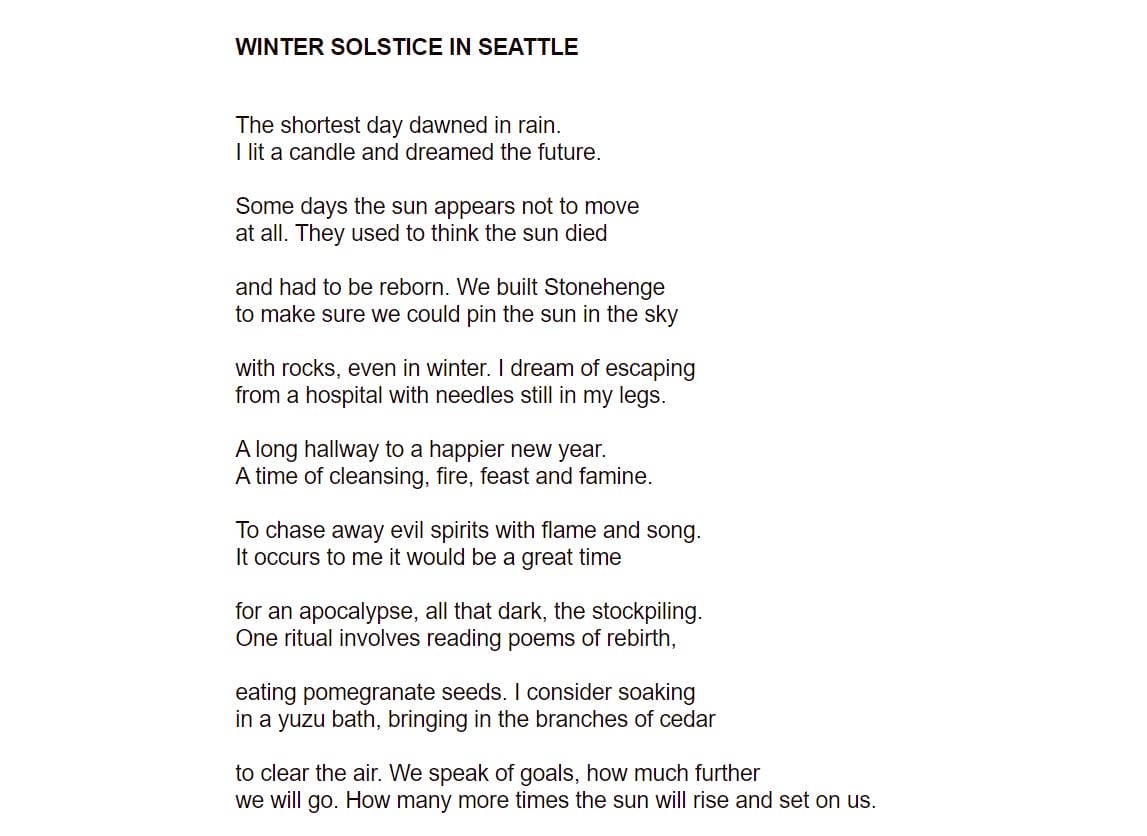
Missing AWP and Good Resources on the Coronavirus
Yes, I’ll be missing AWP this year. I’m supposed to get an emergency root canal tomorrow instead of flying into Texas. Much less glamorous. But AWP kind of has a pall over it this year, especially as it is happening just as more confirmed cases of COVID-19 are appearing all over the US. Hey, let’s all get together in one big room right as a highly communicable virus is hitting. Yikes! I have a genetic immune deficiency AND MS, so this is probably a more frightening prospect for me than most people. That estimated 2 percent death rate is higher for people with other health conditions, and much higher for the elderly – up to 15 percent.
We had the first US death from Coronavirus here yesterday, at a hospital about a mile from my house, and a small breakout (fifty people, both caregivers and patients) has happened in a long-term care home in Kirkland (and Kirkland and Redmond firefighters are in quarantine after reto an emergency there). There is a lot of uncertainty right now – the doctors and systems here don’t have enough test kits or the capacity to test everyone, we don’t have enough masks even for medical personnel due to poor government planning, and we’re showing more community-acquired illness (two high school kids at opposite ends of town just this week). In my local neighborhood stores, there’s been some panic-buying – shelves of masks, hand sanitizer, cleaning products, even in some places bottled water and toilet paper have all been cleaned out. My husband has been running most of the errands to keep me out of crowds, so I’m getting my reports second-hand. Going back to spending time outside, which can really help you not feel too house-bound when you’re mostly confined in your home, is really important. Hence my red-winged blackbird picture (photographed down the street from my house).
Here are some good resources that I found this week to help you all with Coronavirus. Remember I have a biology degree and I had a specific interest in virology, so I’m not just a poet – I’m a poet who knows too much about viruses! There’s a lot of panic, anxiety, and misinformation out there (this is not a hoax – and definitely do NOT drink bleach!). Our government is not adequately prepared – we don’t have enough testing kits (we have dramatically undertested over the last six weeks as the virus has spread, and we still won’t have enough tests for two more weeks) or masks for medical personnel, or respirators for those who go into respiratory distress. We can’t control a selfish, irresponsible government who doesn’t act in the best interest of its people (except by voting them out eventually) or a greed-filled, short-sighted pharma/medical complex (our supply chain is going to be impacted because we no longer make the drugs we need – nor their main ingredients – they’ve outsourced almost everything to China, and they didn’t order more masks/respirators when they were told to several years ago to prepare for a crisis because “it was too expensive”) but we can control our own actions – choosing to stay home when sick, washing hands more frequently, maybe staying away from crowds when possible – and we can choose to be kind to ourselves and our neighbors. Drink more fluids, get more sleep. Here’s more information:
From Australian virologists who have practical advice for “If you’re about to be in a pandemic”
A great article on a reasonable response to Coronavirus – and why being prepared – and preparing to help others – is key to containing a pandemic.
NPR’s tips on how to prevent and prepare for the novel Coronavirus
Don’t panic, and always carry a clean towel – Hitchhiker’s Guide to the Galaxy.
More updates to come. I am wishing you all a safe, happy, and healthy week. Spend some time outdoors with trees, and indoors with some poetry. Stay well.
Hanging Out with Poet Friends, Signs that Spring Is On The Way
- At February 23, 2020
- By Jeannine Gailey
- In Blog
 1
1
Signs that Spring is On the Way!
After a seemingly endless gloomy, wet winter, there are signs everywhere that spring is on the way. Despite the thunderstorm this morning, we’ve actually had some sunny days this last week, and then…surprise – a few blooming branches have been spotted here and there, and the display garden at my local gardening store is inspiring garden designs. (Planted a Daphne and a Viburnum today.)
It can’t help but lift the mood of my city, as a collective, despite gloom and doom in the news (Russians hacking the elections! The Coronavirus! Etc!) people are smiling more, chatting more, nodding to each other in the street. I’m definitely a spring girl – I was born in the spring, National Poetry Month is in the spring, plus flower flowers flowers! I’ll share a few images I snapped this week. Plus, I saw an eagle flying overhead every day this week. And our bobcat visited again! (Video link at end of post.)
- Mystery white blooming tree
- Sunset at Kirkland
- First Cherry blossoms
- Mystery berry tree
Spending Time with Poet Friends
Carved out some time (and energy – been a little under the weather) to attend a poetry potluck celebrating my friend Kelli Russell Agodon’s book contract with Copper Canyon Press, and it was great! I got to catch up with some friends I don’t see very often who I’ve known for fifteen, sixteen years now and meet others I’ve only “seen” on Facebook. Some of my old friends had little kids when I met the who are now in college or grown-up with jobs. We talked about where our lives had taken us. Some talked about not submitting or writing for a while. Some talked about new books and planning readings. It always helps give me perspective on the writing life and all of our journeys when I hang out with other writers. It also gave me motivation – I came home and submitted a piece of fiction (which I rarely do) and sent out some poems as well. There is just something about being with other writers that inspires me to action.
I even got to take a picture of some of the poet husbands I’ve known for just as long – and Glenn fit right in (except he was sad he didn’t have a hat! And I couldn’t get a picture where he had his eyes open)!
- Kels and I at an angle
- Group photo at the party
- Poet husbands – Kevin, Rose, and Glenn
- Holly Hughes and me
I was reminded that the writing life is a journey. There are ups and downs and detours, time to write and time to rest. We don’t all go at the same pace. Life gets in the way sometimes. A supportive spouse can make a lot of difference (and I feel lucky to have mine – plus everyone raved about his gluten-free mini pumpkin pear cupcakes)! And encouraging each other is part of the job. It can feel awfully lonely when those rejection slips roll in, or when your grant application is denied, or that job doesn’t come through. It’s good to have the company of people who have been there, done that.
And as promised, a link to the bobcat video on Instagram: https://www.instagram.com/p/B8ywucGBVQ4/
Valentine’s Day (and Day After) and a Discussion of Book Promotion and Maintaining the Writer’s Life with a Disability or Chronic Illness
- At February 16, 2020
- By Jeannine Gailey
- In Blog
 3
3
Valentine’s Day (and Day After)
This week didn’t start out great – I went in for a dental exam and cleaning and they found another tooth in need of an immediate root canal, I was put on more antibiotics, and at midnight on Valentine’s Day I got a text that said my dad was back in hospital with pneumonia. I spent a worried night and didn’t celebrate much on Valentine’s Day, especially since I had to spend an hour at the doctor’s office getting more tests. Sigh. My sweet husband did get me this wonderful bouquet, which actually had flowers that smelled good – even the roses, miraculous in February – which helped, even though I was mostly wiped out from an anxious night.
The day after Valentine’s Day was a little better – first, no doctor’s appointments, second, my dad was responding to treatment, and third it wasn’t pouring rain so we were able to get out of the house a little bit (although it’s been cold, in the forties, so still not like, awesome outdoor weather yet).
So Glenn and I went to Willows Lodge for drinks, dessert, and their live music, for a belated Valentine’s celebration. We came home and watched romantic movies and had chocolate-dipped strawberries and duck for dinner. This morning the morning actually had a little bit of light in it, as opposed to total gloom.
Also this week we got most of our taxes and (ahhhhh) I turned in my NEA grant application. Always a long shot, but I’m glad I got it done. I also sent work out to two more “dream” journals and had an invitation from a press to send a full-length manuscript, so that was nice. (Also had a couple of rejections, but of course that’s part of the process.)
I also read a really eye-opening essay on disability and expectations of writers, which brings me to my next topic…
Book Promotion – and Maintaining the “Writer’s Life” – with a Disability and/or Chronic Illness
I came upon this article almost by accident: Cripping the Book Tour, Guts Magazine. In it, Leah Lakshmi Piepzna-Samarasinha discusses ablism in how it impacts the book tour industry – expectations for traveling which are hard on those with immune problems or wheelchairs (or who, like me, have both), inaccessability at readings, and, most interesting to me of all, how abled people who run readings and invite people to speak at colleges can make things more equal for the disabled. Like, putting in a ramp to get to a stage is the bare minimum. What about paying for writers to Skype into classes or readings? What are the ways, if they say they want disabled poets to participate, they actively provide for accessible venues? What about reconsidering the way that a writer maintains a life? Anyway, the whole thing got me thinking…
When I write PR for Poets, I was grappling with a terminal cancer diagnosis (my tumors have since been classified as “stable” but I still have to get them scanned every six months). I was about to get a diagnosis of MS. These things have changed how I view book promotion in my own life and also how I might write about it next time.
Since I started promoting poetry books in 2006 (I’ve had five books published since), things have changed – the technology, the realities of travel, and in my case, my health has become a constraining factor. Last year, for instance, I was invited to read at a college for money – but ended up not being able to go for health reasons. I was also invited to be a featured speaker at a lovely-looking conference in Colorado – but given how difficult travel has been with a wheelchair, and the impact on my immune system, I had to turn it down. In both cases, I offered to appear virtually, but that offer was declined. AWP is coming up, and one reason (well, besides the money AND persistent accessibility problems at the conference itself) is that the travel is so hard on my system and the rewards don’t seem like enough to balance that out. The book addresses ways to reach new audiences that don’t involve physical travel – blog book tours, for instance, or virtual appearances at book groups or colleges, as well as social media outreach – but it could have gone further.
If you, as a healthy able-bodied writer in the world – an editor or a professor or someone who runs a conference – want to support disabled or chronically ill writers, teach their books. Encourage your students to buy books, or request their books from libraries. Give disabled or chronically ill writers chances to do phone interviews, Skype sessions, radio appearances.
The reality is, my health and disability can limit my ability to have a writer’s life – the way traditionally the writers make money from books is being invited out to speak at colleges or at readings at conferences, so if you limit your travel to, for instance, locations you can drive to because the last two times you flew you caught pneumonia or the airlines lost your wheelchair (yup, both happened to me) – you’re also limiting how much you get paid, how many audiences you reach, how many copies of the book you sell.
Or…is that still true? I started thinking harder about this. When I started promoting my first poetry book, the number one way to sell copies was to travel to readings and people would buy books there. For my second book, the best way to sell was to send out paper postcards with buying information on them. By the time my last book came out, yes, I sold books through readings and postcards, but I sold the most copies through my blog and Facebook/Twitter announcements. If the world is really getting more technology oriented – working from home, virtual meetings – then maybe the way you sell poetry books has changed, too. I think about Instagram poets, who have a million followers and sell a million books – all without even making a personal appearance.
I also think how writers in the past – like Emily Dickinson or Flannery O’Conner – coped without doing big book tours or personal appearances. Flannery and Dickinson both had copious letters – I’ve read a lot of them – as did writers like Sylvia Plath and Virginia Woolf – to keep them connected to the larger world of the arts. Flannery might have gotten sicker faster because she travelled to do speaking engagements for money. Plath definitely pushed herself in order to be seen as successful. “Self-care” wasn’t a big priority for them, or even a word used or even a concept that was popular in their lifetimes, although it probably ought to have been. It could make the difference, for some writers, between, quite literally, life and death. Good health care is not a given here in America. The difference between “success” and “failure” for any writer might be a whisper thin margin – an award, a grant, a paid opportunity.
I think we’re pretty far from having equitable opportunities right now for chronically ill and/or disabled writers. But maybe with the energy and work of disability activists and people in the arts world making the effort to think about how they reach out to disabled artists and audiences – things will change for the better.
February First Flowers, Floods, Supermoons, and Superbowls, plus Poetry Grant Writing
- At February 09, 2020
- By Jeannine Gailey
- In Blog
 2
2
First Flowers of the Year in February
In my yard, the first thing to bloom is usually our pink camellias, and they opened spectacularly yesterday, despite a week of hail, snow, flooding, wind, and other February nonsense. It makes me think spring might be around the corner – a cheering thought, after a terribly gloomy winter.
People all around us were flooded out of our homes – river trails and trees disappeared under water, cars were swallowed, people evacuated – we are lucky to live on top of a hill, and the river is a few miles away, but all week I’ve been watching the news every morning, flooding/road closures/power outages and coronavirus the two top stories, and then the politics, oy. So that put me in an apocalyptic mindset. Yesterday we went to the local gardening store to get a few sweet pea starts, which it might be a little early to plant, but we goofed around with the faux flower Valentine’s Day displays too, which was very cheering. I snapped a picture of what was normally a tiny creeklet across from one of our local winteries, but as you can tell, this is a tiny creeklet when it floods.
- Normally a trickling creeklet
- Camellias in our yard
- Posing with faux flowers
- Glenn and I at Molbaks
Superbowls and Supermoons
We’re having the first Supermoon of 2020 – the Snow Supermoon. Speaking of all things super, we were happy to have my brother and sister-in-law – aka our Seattle family – over for the Superbowl. It was great to visit with them and Glenn got to practice his Superbowl snack-making skills, and this year we had a sprinkling of snow, but nothing like last year’s blizzard.
Poetry Grant Writing – A Chore That Doesn’t Seem to Get Easier
Every two years I go through the grueling ritual of applying for the NEA grant. I don’t know that these kinds of applications get easier – well, they don’t for me – but they seem like a necessary ritual when poetry, teaching, and freelancing don’t add up to enough to really pay the bills. I looked at the last application and didn’t like my last poetry sample at all. I feel more confident about this one, but who knows what the NEA readers will like? It’s always a gamble and a mystery. There are a couple of state grants in Washington for writers but they’re much smaller so it seems worth it to take the time on this, even though I’ve been sending for years only to be rejected.
It takes focus to finish this kind of thing – at least as much effort as, say, doing your taxes – so I’m trying to get it in so I don’t have to worry about it anymore. I think about what I could do with this grant – make my house a little more handicapped-accessible, or pay off some of my student loans – not glamorous goals, but they certainly would improve my quality of life. So cross your fingers for me – and if you’re going through the same motions right now, good luck to you! And if anyone has any tips they’d like to share (ahem, previous NEA grant winners) I’m sure I and all the readers would appreciate it!
Finally February: A Feature for Women in Horror Month, Proofs from Poetry, and a Little About Royalties for Poets
- At February 01, 2020
- By Jeannine Gailey
- In Blog
 0
0
Finally February! And a Feature for “Women in Horror” Month!
OK, January is over and can I say, “Finally!” Deaths in the family, volcanos, earthquakes, Australia on fire, Coronovirus, Impeachments – oh and the gloomiest (by rain levels and lack of light) month on record in Seattle. I’m ready for February.
And February is “Women in Horror” month and I’ve been featured – with an interview and some of my horror poems – on Colleen Anderson blog. Check it out here! I bet some of you don’t even think of me as a “horror” writer – but look, I really am!
Proofs from Poetry – Look for the April Issue!
My last week was brightened by getting my proofs for two poems in Poetry Magazine – which means it’s really happening and that acceptance wasn’t just a dream – and the news the poems would be in their April issue. Since that’s National Poetry Month AND my birthday month, it couldn’t seem like better timing. I sent my first submission to Poetry when I was 19 years old, and I have my own archive of Poetry back issues going back at least ten years. Now I’ll get to actually be in the archive! So it’s been a goal for more than twenty years.
A Little Talk About Royalties and Poetry
Another thing that cheered me up was getting a royalty check from Two Sylvias Press to deposit in my bank account. If you are a poet, even if you sell a lot of books, you might not always have a publisher who is good about getting you your royalties – not because those publishers are corrupt, but they tend to be poets, and poets tend not to be good at things like “keeping track of books sold” and things like that. I feel really lucky when I get my checks, especially when they are for more than it costs to buy lunch. Anyway, if you can discreetly check on a publisher before you do a book with them – a good way is to ask another author with the press if they’ve ever received a royalty check – that’s probably good. I mean, none of us poets are doing it for the money – but if you’re like me, you appreciate getting feedback on how your books sold in a royalty statement, and a little tangible evidence with money is even better.
I once told a friend, years ago, than royalty contracts did not matter with poetry books. So many poets just feel lucky to have their books published! I’m not so sure, after five books, that I’d say the same thing. Read that royalty contract, see how often you can expect to receive royalties and royalty statements, what rate you’ll get, etc. Don’t make it the most important thing in your decision, but consider it among other things – like distribution, quality of books, aesthetics of book covers and fonts – that help you decide which publisher to go with. Some publishers pay royalties with copies – which was always just fine with me – the most important thing was that someone, somewhere was keeping track of how many copies each book sold. It’s getting feedback on that stuff that helps tell you what you can do better. You wouldn’t expect a football quarterback to get better without feedback from a coach, videos, stats, etc, right? It’s the same with poets! (See? I even got some Superbowl into this blog post – LOL.)
Sunbreaks in the Rain, Surviving My First Root Canal, Finding Flowers in Our Darkest Winter Month
- At January 27, 2020
- By Jeannine Gailey
- In Blog
 1
1
Sunbreaks in the Rain
This has been the wettest January on record for Seattle and its environs, and I have definitely felt it. You have to try to get out in the rain, and hope you’ll be lucky enough to catch a sunbreak or a rainbow, the way I did right after I shot this photo. January is also so dreary and dark here, that even people without clinical seasonal affective disorder can feel a little depressed and stifled.
I don’t hate the rain, or the cold, or the dark, at least not individually, but when they all gang up on you…
Surviving My First Root Canal
I had my first root canal, with no Novocain, but with sedation. It wasn’t too bad, but it turned out my tooth’s infection was bad enough to take me down for a few days while I recovered with the aid of antibiotics. And the bad news is, the tooth right next to it – which already has a crown – needs another one. At least I won’t be so afraid of the next one. Anyway, if any of you have been scared to get one, it wasn’t so bad! I remember thinking, even through the sedation, that it didn’t even hurt very much! Now I have to wait a couple of weeks to have a crown on that broken tooth, which is nerve-wracking, because if I hurt that tooth’s temporary bonding, I might have to get an extraction instead of a crown.
Anyway, yay, I survived, and even though I was a weirdo dental patient – a little out of the ordinary, the endodontist had to use a special filling, my root was shaped unusually, and all that no Novocain thing – everything was just fine. The funny thing was, they tell you not to sign any contracts or shop while you’re on the sedation drug, called Versed – but I submitted three book manuscripts that night, which I don’t remember, and bought two lipsticks and a shampoo – I guess it could have been worse! And a couple of days later, mostly sleeping I stumbled out into the rain…and found deer in the yard! They had munched on a bit of our camellias, but I guess that’s all right. And I’ve been trying to take advantage of all the sunbreaks and rainbows I can.
Finding Flowers in January
I was determined, in the heart of January cold and dark, to discover some signs of spring. A few hyacinth plants are starting to shoot up, and this blooming shrub did not get killed by the snow. I ventured out to our local nursery, to see what they had to offer – a bunch of faux flowers, a few camellias, primroses, and cyclamen in bloom, and mostly bare-root plants. It was still fun to try to plan a little bit for spring, or at least pretend for a little bit.
Flowers seem like a metaphor for hope to me. If you’re in that time in between good things, a long losing streak when you’re waiting for good news or the right publisher, just watch. It could be closer than you think.
- Posing with faux flowers
- Posing with real flowers, and stream
- Glenn and I take advantage of a sunbreak
A Week of Being Snowed In, Art Date at the SAM, and a Little Poetry Catchup
- At January 19, 2020
- By Jeannine Gailey
- In Blog
 4
4
A Week of Being Snowed In
Here in Seattle, we don’t get snow very often, but this last week brought a combination of freezing temperatures, a ton of snow over four days, black iced roads (including a 30 car pileup on the Floating Bridge) – that kept us mostly indoors all week. Root canal? MRI? Running errands? No dice.
So I got a lot of reading done. I started watching Austen’s unfinished novel Sanditon adapted on PBS (and read the original 11 chapters, which took me 45 minutes and renewed my appreciation for Austen’s funny asides.) We also had a modem go out, so one whole day we didn’t have phone, internet, or cable. So, yes, if you’re asking, I am going a little stir crazy.
- Snowy brannches
- The beginning of the snow
- Snowy hummingbird
An Art Date at Seattle Art Museum
So, periodically, and especially after a week of being trapped in my house AND awaiting a Monday root canal, I take myself on an art date. Today we went down to SAM and waited for four different elevators (SAM could use a little work on the accessibility front – we had to wait for a staff member to call someone else to get one elevator that was the only way to access the actual Flesh and Blood exhibit we’d paid to see and that cost us fifteen precious minutes. We got there an hour and fifteen before close, but it literally took me twenty-five minutes to get to the exhibit because I’m handicapped. Not cool, SAM – not everyone can climb a bunch of different confusing stairways to get to everything!) We enjoyed the art, but not the frustratingly designed for only able-bodied journey to getting to see it. My favorite things were the Titian, Parmigianino’s portrait of a young girl named Antea, and discovering a new local artist’s work at the end of the show. Oh, and the whole reason I went to the show – this amazing and disturbing painting!
Anyway, there was a Titian, a Raphael, and several El Greco paintings, but that painting is one I had been obsessed with since I saw a slide of it in in Art Appreciation Class when I was 19 – a painting of Judith Beheading Holfernes by Artemisia Gentileschi. The painting itself is striking, the portrayal of the female body in struggle amazing, but the story behind it even more so – Artemesia was seventeen and an apprentice to another painter who violently raped her. Her father, also a renowned artist, took the rapist artist to court, but it was a strung out procedure and Artemesia did not find justice. She did, however, find the inspiration to paint her new subject – female saints and Biblical figures, usually unfairly attacked or in the middle of attack. My art history teacher said that Judith is modeled on Artemesia and Holfernes on her rapist. The dark and light, the shadow, the blood, and the odd muscularity of the action would all make this a fascinating piece even without the history. They recently discovered a self-portrait of the artist and she did, indeed, resemble this Judith very much. I just ordered a book about her history because it deserves more study, don’t you think? Fascinating?
- Useful Things by Phyllis Emmert
- A Titian
- Portrait of a Young Woman Named Antea
A Little Poetry Catchup – and the Benefits of Downtime
So, I’ve been writing, sending out work, sending my book manuscripts out to publishers, you know, the usual. I didn’t finish a book review I meant to do during the “snow days.” I got the proofs for my poem upcoming in Ploughshares (!!) about which I’m tremendously excited. I also found an e-mail in my junk folder that was the editors letting me know they were passing on my poems to the featured editor – but I never got the e-mail so I missed being nervous about it for months! Ugh. Technical glitches (Submittable? My e-mail service?) can make getting and receiving poetry news a tense uncertain situation.
January seems like a good time for sending out work, and I find I tend to write a lot in January too. How about you? It’s also a good time for finishing reading projects. I finally saw the new Star Wars movie too, on one of the snowy afternoons we were able to get down the street to the virtually empty theater, and am happy to report I was pleased that they showed the porgs again, albeit briefly. I read some “for fun” fiction and it felt good! I need to remember to read sometimes for fun more often. That’s what downtime is for!
I was reminded, during this week of snow days, of the importance of “poetry downtime.” The time when you don’t feel like anything is happening – you’re not actively inspired for a new series of poems, you’re not hearing back from anyone – can be the most important times for your work. These are the times when you get a chance to look at your poems without the rush – you may find the typo, or adjust your line breaks, or decide one of your poems needs a new ending. If you’re working on a manuscript (or two) like I am, this is a good time to re-check that your manuscript order still works – maybe there’s a new poem you need to put in to give the book more momentum, or something you need to take out or shift around. If you lack downtime, you never get that truly relaxed time to revise and reshuffle, to do the things that might take your work from “pretty good” to “excellent.” You can’t rush revision – for me, it happens a little at a time, usually on a poem after a week or a month after I’ve written it, when you re-read it and notice the little things that make the poem happen or slow it down. It’s also the time to research new journals or publishers you might have overlooked – poetry journals are continuously being born and closing down, so it’s hard to keep your finger on the pulse of things. Check your subscriptions – do you want to try a new journal for a while? And check the submissions times of your favorite publishers – they can shift from year to year. See? Now you’re caught up, you’ve had a little time to breathe, and you can make all those little tweaks that you might otherwise overlook. The importance of downtime, whether snow-day-induced or not! Wishing you a great writing week.
Sharing a Little Good News, The First Reading of 2020, and Learning to Balance with MS
- At January 12, 2020
- By Jeannine Gailey
- In Blog
 2
2
Some Good News, Finally, in 2020
Hello my friends! After a very rough beginning to the new year, the metaphoric rainbow has appeared (and also the first real rainbow!)
This week I can finally share with you a little good poetry news, and I had a wonderful time catching up with poetry friends and has my first reading of 2020 – in fact, the first reading I’ve done since last year’s AWP in Portland.
Two Poems in an Upcoming Issue of Poetry Magazine
Remember that good news I vaguely referred to last month? This is really exciting to me, because I remember sending out my first poetry submissions at nineteen, and Poetry Magazine was one of them. I even think the editor sent back a sweet encouraging rejection note. Now, at 46, my first acceptance – and two poems! I am over the moon. And my mother-in-law bought me a new subscription to Poetry Magazine. Isn’t that sweet?
Speculative Feminist Poets at Open Books
January, usually a dismal month here (we have a week of snow coming up in the forecast, odd for us) was also the Seattle’s MLA Conference, and so I got the chance to visit with long-time friend (but seldom seen, as she lives in Virginia) Lesley Wheeler. We hung out and caught up at the Bookstore Bar at the Alexis (after being turned away from the Sorrento’s Fireplace Room because of “silent reading night.” That’s fine! We’ve got multiple great meeting places for writers in this time. But I will hold a grudge!) Then tonight we got together with another local speculative poet, Jessica Rae Bergamino, to do a Feminist Speculative Poetry night at the lovely local bookstore Open Books. (I came home with three books on top of Jessica’s terrific Unmanned – and I’m really looking forward to Lesley’s new book due out in two months.) I was worried people would stay away because of the unwelcoming weather, but we had a great crowd, not only a good sized crowd but a warm and appreciative crowd, and listening to Lesley and Jessica read was a real pleasure. There were poems about space, robots, foxes, Nancy Drew, apoclaypses, Princess Leia, David Bowie…let’s just say this was not your grandmother’s poetry night.
- Lesley and I at the Bookstore Bar
- Jessica, me, and Lesley before the reading
- Lesley and I pre-reading
Learning to Balance with MS
One thing the beginning of 2020 is bringing home to me that I need to learn to balance my life with my MS. When my dad was in the hospital and my grandfather passed away, I hated that I couldn’t just jump on a plane to be with my mom in Missouri or my dad in Ohio. Unfortunately, with MS (and I had the flu and was awaiting an emergency root canal), I’m just not able to do the kind of spontaneous last minute travel – or the caretaking – that I used to be able to do. I would have to book an accessible flight, accessible rooms at hotels, which is not always easy at the last minute. And I’ve learned if I push myself when I’m sick, MS will raise it’s ugly head in unexpected ways, and I can end up in the hospital. So I don’t want to live an overly limited life but I also have to learn where my limits are.
It’s the same with readings – I don’t do as many as I used to because asking my brain to stand, read, and breathe at the same time is asking a lot. Within a few minutes, I start to shake, my breath is hard to catch, and every word sounds a little wobbly. That didn’t used to be the case. I still love to do readings, but I have to limit them to when I have the physical energy to do them, and I have to take a down day before and after just to be able to do that. It kind of sucks. I still love seeing other people read, and enjoy sharing my work, but I just don’t have confidence the way I used to. On the other hand, visiting with friends one on one, even in a crowded area, is still fine, as long as I put my whole focus on my friend and not the surroundings. So, yay to the things I can still do pretty well!
So I’ve lost the ability to travel easily, or appear effortless at readings. I have to plan things in advance, and literally put “rest” on the schedule. It’s an adjustment, still, even two years after my diagnosis. I still walk with a cane, and wobble if I try to walk across the room without it. Lack of balance is a well-known MS symptom and it’s also a metaphorical problem – how do you balance a “normal” life with MS? I had a friend at the reading who told me it was helpful to read my writing about these things, because it’s hard to understand MS and it hits everyone differently. So I hope this has been helpful! I hope the rest of 2020 is kinder to us all.
Wishing for a Better 2020: a Death in the Family, What to Write When WWIII is Trending, and Speculative Poetry Reading This Saturday
- At January 05, 2020
- By Jeannine Gailey
- In Blog
 1
1
Wishing for a Better 2020
After a quiet, uneventful, and thoroughly happy New Year’s Eve (see: pictures) I woke up on New Year’s Day to the news that my grandfather had passed away at 99 and “Death to America” was trending. My father had just gotten out of the hospital for pneumonia and I broke off a piece of tooth in my sleep. In addition, it’s been cold and blustery here, too miserable (40s and rain) to do much outdoors, but Australia in midsummer is on fire, and its distressing news (the koala population might be functionally extinct! Here’s a picture of the red air in New Zealand right now!) keeps surfacing as well.
I am one of those people who tries to find the positive but it’s been a rough beginning to 2020 for me. My MS neurological symptoms have been acting up a bit – stress definitely plays a part in that – so I’ve been trying actively to avoid any extra bad news (except when I go on Twitter, which I’ll get to later.)
I’ve been writing a ton and even got an acceptance or two in the new year but it’s been hard to focus on that in the middle of everything else. Are you having the same issue? Are you still feeling hopeful for 2020?
What to Write When WWIII is Trending
So, the day after New Year’s day, I woke up to “WWIII” trending on Twitter. How to address the world like this? What can you possibly do or say to help the situation? I can’t do much when it comes to world politics, I can protest, I can vote when the vote comes around, I can call or write letters to my local congress people, but I cannot create peace on earth on my own.
It was hard already trying to help my mom when she’s in a different state (and her father was in a totally different midwestern state) and this tooth that’s due for a root canal is just shredding itself for some reason in preparation. I can’t control any of those things. Small acts of love, kindness, and peace? Yes. I can try to breathe. I can try to focus on the little everyday beauties around me.

Shelfie of some books that were really important to me when I first started writing. Good to return to inspirations.
My Twitter feed usually has very little politics, a range of writing news and announcements, nature pictures, and definitely no hellscapes, but this week has been different. I must have a lot of friends in New Zealand and Australia, because pictures of Hell-colored red air and smoke have been prominent on my timeline, along with fights about Iran and war. I’ve been writing about apocalypses for a while (see: Field Guide to the End of the World) but it’s always surprising to see how fast the apocalypses might be approaching on the horizon.
So what do you write when WWIII is trending? It’s not wise to get your news solely from social media, so I’ve been avoiding social media for things like reading and I’ve been checking in with my mom and dad back in Ohio to. I’m tackling my reading stack from the books I got for the holidays. I’ve been writing poems that try to make sense of the chaos. Which is impossible, of course.
I went back to some older books, books by older authors like Stella Gibbons and Karen Blixen, which helped me remember that in the 1920s, there was irrational exuberance in the stock market, decadence and flappers and a wonderful proliferation in the art and writing world, and they were about to face World War II and the Great Depression. I went back to some of the books that helped me become the writer I am today, fairy tale and mythology writings that talk about how we tell stories, and why they’re important.
As writers, we can do one thing: we can document the world, our world, the specifics – the moods, the visuals, the attitudes. We can try to capture the moment, whatever that moment entails. That doesn’t mean we contain or control it – but at least we can offer perspective, a point-of-view, an account from the ground, so to speak.
Speculative Women Writers and Dinner with Friends
The MLA Conference is taking place in Seattle this upcoming week, which means Seattle folks can catch up with their friends who are fancy faculty in other states and that there are great readings all around the city this week. I am lucky enough to have a dinner scheduled with Lesley Wheeler, who is a great speculative writer and all-around motivated, hard-working, kind and thoughtful human (she has a novel and a poetry book coming out!) and then a reading with Lesley at Open Books and Seattle-based writer Jessica Rae Bergamino this Saturday January 11th at 7 PM!
I can prove that though I’ve known Lesley for years, because she lives and teaches on the East Coast, we rarely exist in the same space or even time zone – note the sole picture I could find of us together to the left was taken several years ago – so I’m excited for the opportunity! And I haven’t done a reading at all in a while, so I hope you come out and see us.
It’s actually a perfect time to celebrate speculative poetry, during a time period that is often described as possibly an embodiment of the futuristic dystopias written years earlier, a time of apocalyptic fires and conflicts. What better time to imagine the future? I’ll be reading a bit from Field Guide to the End of the World, but also a bit of new work, which has a fiercer, but more hopeful, apocalyptic mood, from one of my manuscripts that has been circulating. I hope it will lift your mood, and mine. Here’s to a better 2020!




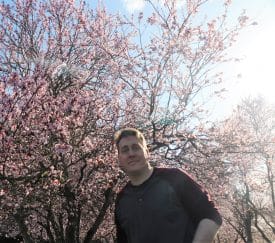









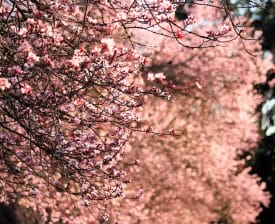

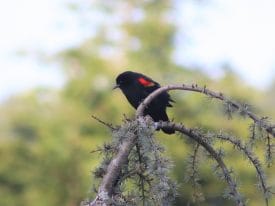



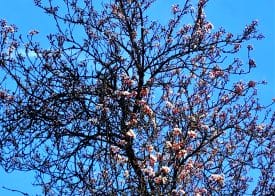

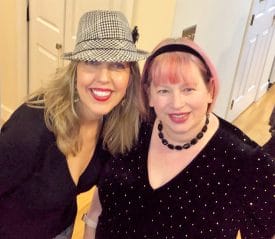
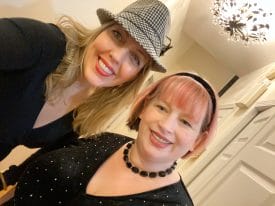

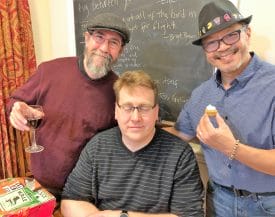

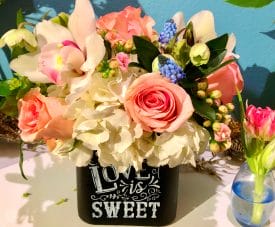




























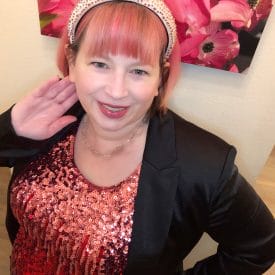





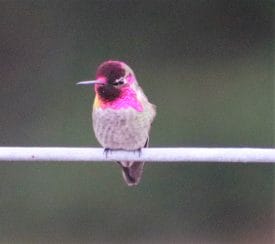


 Jeannine Hall Gailey served as the second Poet Laureate of Redmond, Washington and the author of Becoming the Villainess, She Returns to the Floating World, Unexplained Fevers, The Robot Scientist’s Daughter, and winner of the Moon City Press Book Prize and SFPA’s Elgin Award, Field Guide to the End of the World. Her latest, Flare, Corona from BOA Editions, was a finalist for the Washington State Book Award. She’s also the author of PR for Poets, a Guidebook to Publicity and Marketing. Her work has been featured on NPR’s The Writer’s Almanac, Verse Daily and The Year’s Best Fantasy and Horror. Her poems have appeared in The American Poetry Review, Poetry, and JAMA.
Jeannine Hall Gailey served as the second Poet Laureate of Redmond, Washington and the author of Becoming the Villainess, She Returns to the Floating World, Unexplained Fevers, The Robot Scientist’s Daughter, and winner of the Moon City Press Book Prize and SFPA’s Elgin Award, Field Guide to the End of the World. Her latest, Flare, Corona from BOA Editions, was a finalist for the Washington State Book Award. She’s also the author of PR for Poets, a Guidebook to Publicity and Marketing. Her work has been featured on NPR’s The Writer’s Almanac, Verse Daily and The Year’s Best Fantasy and Horror. Her poems have appeared in The American Poetry Review, Poetry, and JAMA.






